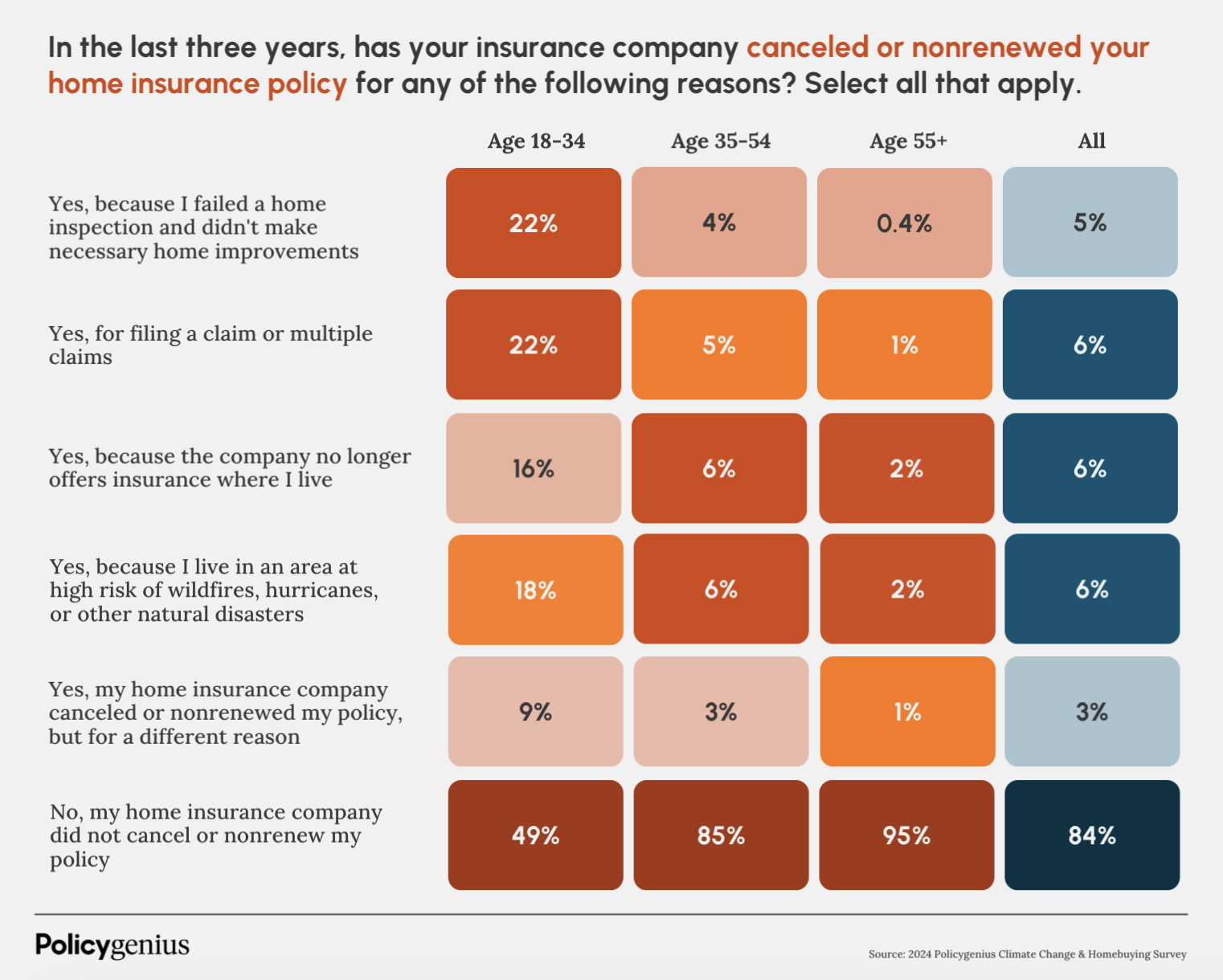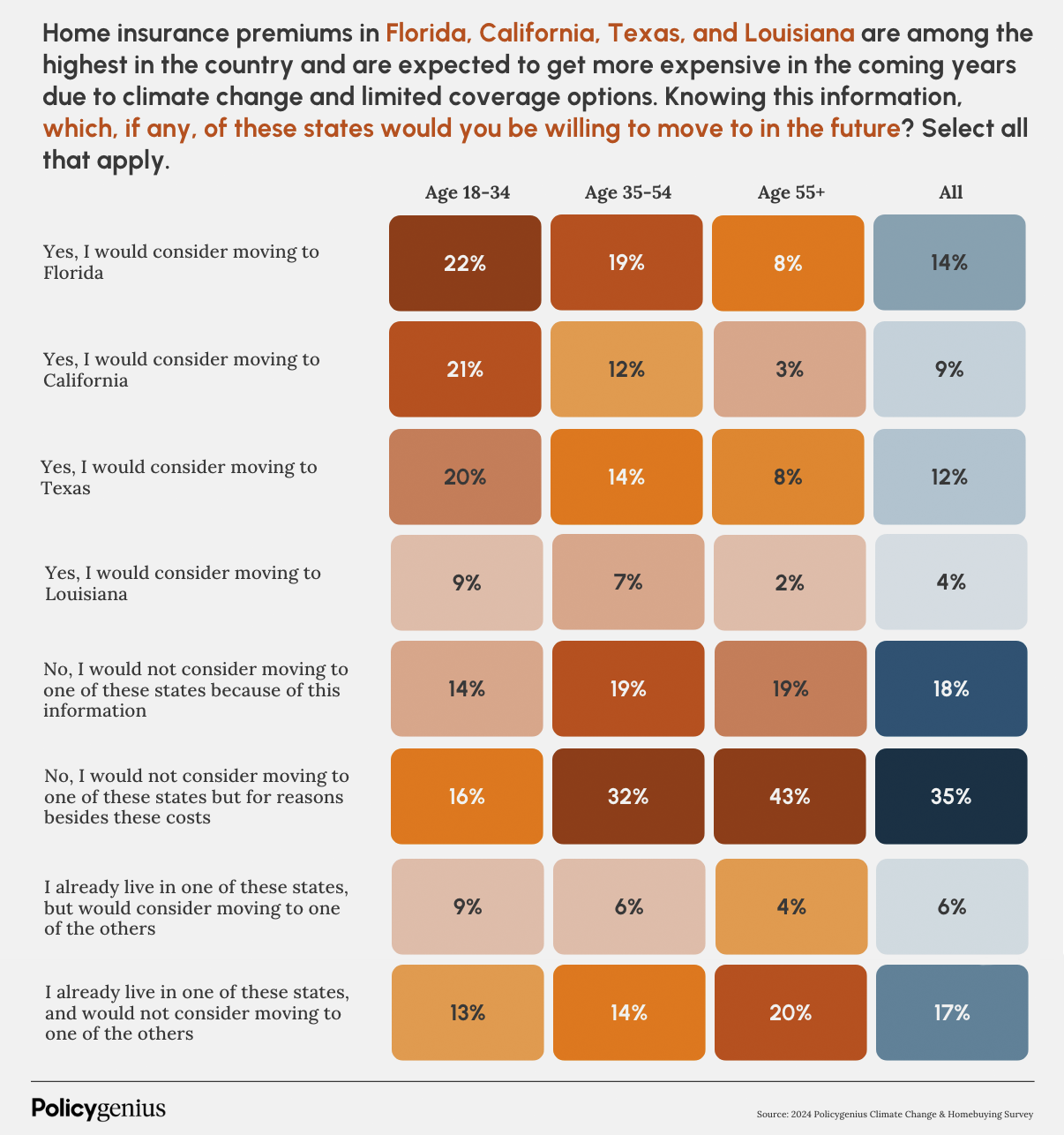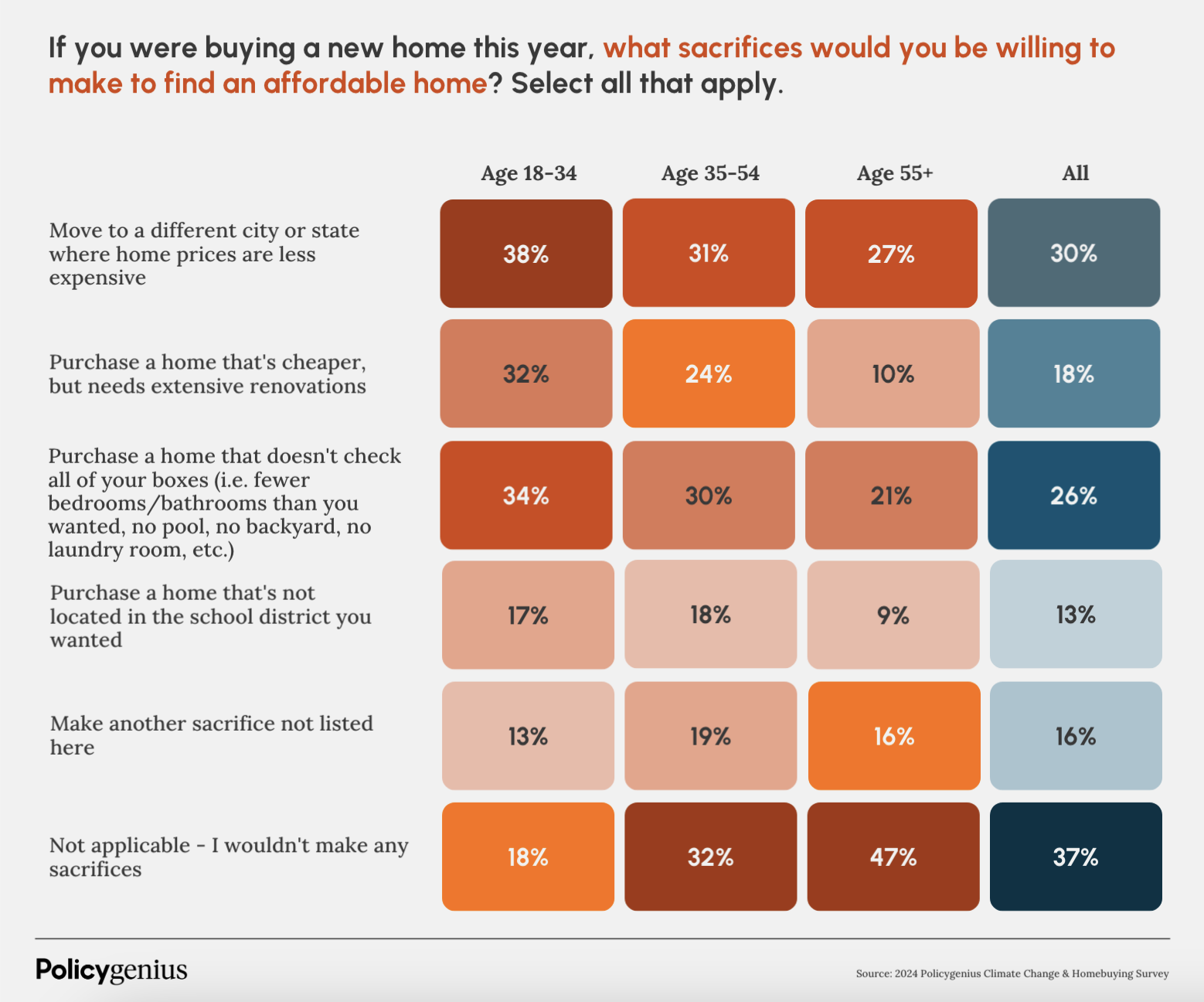Younger homeowners are more likely to have home insurance dropped

JOKE_PHATRAPONG // Shutterstock
Younger homeowners are more likely to have home insurance dropped
A young woman looking up information on home contracts and insurance using a phone and a laptop.
As climate change continues to worsen the severity of extreme weather and expensive property damage, home insurance companies in Florida, California, Louisiana, and other high-risk states have adopted stricter underwriting rules or are choosing to no longer sell policies in these states. Meanwhile, homeowners are left scrambling to find coverage after their policies are canceled or nonrenewed.
Younger homeowners are feeling the effects more than others, according to the 2024 Policygenius Climate Change and Homebuying Survey.
In fact, of younger U.S. homeowners (aged 18 to 34), 16% said that their policy was dropped because their insurer stopped offering coverage where they live, and 18% had their policy dropped due to living in an area at high risk of wildfires, hurricanes, and other natural disasters.
Key Findings
- 16% of U.S. homeowners said their home insurance was nonrenewed or canceled by their insurance company between January 2021 and January 2024. Of those homeowners:
- 36% were dropped because they filed a claim or multiple claims.
- 35% were dropped because they live in a high-risk area.
- 34% were dropped because the insurer no longer offers coverage where they live.
- 33% were dropped because they failed a home inspection and didn’t make necessary home improvements.
- 19% were dropped for a different reason.
- 51% of younger homeowners (aged 18 to 34) had their home insurance nonrenewed or canceled versus 5% of homeowners over the age of 55.
- If U.S. homeowners were to buy a new home this year, 63% would be willing to make a sacrifice in order to find an affordable home. Of those homeowners:
- 48% would be willing to move to a different city or state where home prices are less expensive.
- 42% would be willing to purchase a home that doesn’t check all of their boxes.
- 29% would be willing to purchase a home that’s cheaper, but needs extensive renovations.
- 21% would be willing to purchase a home that’s not located in the school district they wanted.
- 26% would be willing to make another sacrifice.
- 18% of all homeowners would not consider moving to Florida, California, Texas, or Louisiana due to high home insurance costs and limited coverage options as a result of climate change.
Home Insurance Policy Cancellations or Nonrenewals Hit Younger Adults Hardest
Between 2021 and 2024, 16% of U.S. homeowners had their home insurance policy nonrenewed or canceled by their insurance company. Of those, 34% were dropped because the company no longer offers home insurance where they live, and 35% lost their coverage because they live in an area with a high risk of wildfires, hurricanes, or other natural disasters.
What’s the Difference Between Cancellation and Nonrenewal?
- Cancellation: When an insurance company chooses to drop your policy in the beginning or middle of the term. If your policy has been in force for more than 60 days, the insurer can typically only cancel your policy if you failed to pay your premiums or misrepresented yourself or your home on your application. How much notice an insurer needs to give you before your policy is canceled depends on the laws of your state.
- Nonrenewal: When an insurance company chooses not to renew your policy at the end of your policy term. Depending on the state you live in, the insurer has to give you a certain number of days’ notice and explain the reason why they’re dropping you.
Younger Homeowners Are 10 Times More Likely to Have Their Home Insurance Nonrenewed or Canceled Compared to Older Homeowners
Fifty-one percent of younger homeowners (aged 18 to 34) had their home insurance nonrenewed or canceled in the last three years, compared to 15% of homeowners aged 35 to 54 and 5% of homeowners aged 55 or older.
Among younger homeowners, the most commonly cited reasons for cancellation or nonrenewal were a failed home inspection (22%) and filing a claim or multiple claims (22%). Meanwhile, only 4% of all homeowners 35 and older said their policies were canceled due to a failed home inspection, and just 6% for filing a claim or multiple claims.
Insurance companies conduct home inspections less often on properties that have had a policy in force for several years. This could account for the disparity between younger and older homeowners when it comes to inspection-related nonrenewals or cancellations.
Younger homeowners were also four times more likely than older homeowners to have their policies dropped due to their insurance company no longer offering home insurance where they live or from living in an area at high risk of hurricanes, wildfires, or other natural disasters. Sixteen percent of younger homeowners said their insurer no longer offered coverage in their area, compared to 3% of homeowners 35 and older; and 18% of younger homeowners said that they lost their coverage because of their home’s natural disaster risk, again compared to just 3% of homeowners 35 and older who had their policy canceled or nonrenewed for the same reason.
![]()

Policygenius
Climate Change and Higher Premiums Aren’t Deterring Homeowners From Moving to High-Risk States
Infographic showing percentage of people who had insurance policies canceled for these listed reasons.
When asked if they’d consider moving to Florida, California, Texas, or Louisiana—four states that are either in the midst of a home insurance crisis or nearing one due to natural disasters brought on by climate change—around one in five homeowners (18%) said they would not move to any of these states because of rising insurance rates.
From 2022 to 2023, premiums increased 35% in Florida, 27% in Texas and Louisiana, and 11% in California, according to the Policygenius 2023 Home Insurance Pricing Report. And premiums are expected to get more expensive as insurers continue to limit or no longer offer coverage in high-risk areas.

Policygenius
Homeowners Aren’t Afraid to Make Sacrifices in Order to Find More Affordable Housing—Including Moving Cities or States
Infographic showing percentage of those willing to relocate to Florida, California, Texas, and Louisiana people with the rising cost of climate-change disasters.
When asked if they’d be willing to make sacrifices, such as moving to a different city or buying a home that needs extensive renovations, in order to find an affordable home, 63% of homeowners said they would. Of those, nearly half (48%) are willing to move to a different city or state where home prices are less expensive, and 42% are willing to purchase a home that doesn’t check all of their boxes.
Younger Homeowners Are More Willing to Make Sacrifices Than Older Ones
There’s a generational divide between which homeowners are willing to give up the most to find an affordable home. Eighty-two percent of younger homeowners would be willing to make sacrifices versus 68% of homeowners aged 35 to 54 and 53% of homeowners aged 55 or older.

Policygenius
Methodology
Infographic showing answers to question “If you were buying a new home this year, what sacrifices would you be willing to make to find an affordable home?”
Policygenius commissioned YouGov Surveys to poll a nationally representative sample of 2,324 adults age 18 and older, with 1,286 being homeowners. The average margin of error for responses was +/-2%. For more details, see YouGov’s methodology. Respondents could select multiple answers for questions, so some totals may not add up to 100.
This story was produced by Policygenius and reviewed and distributed by Stacker.